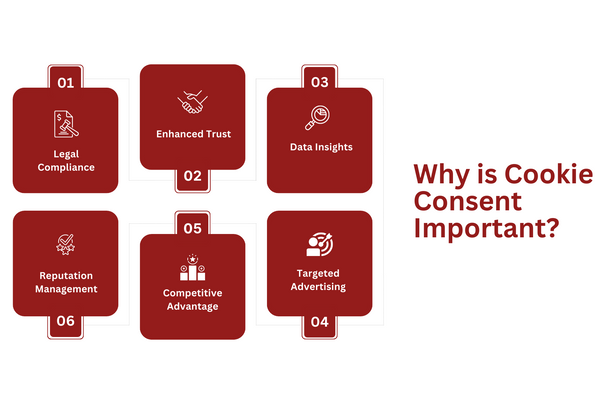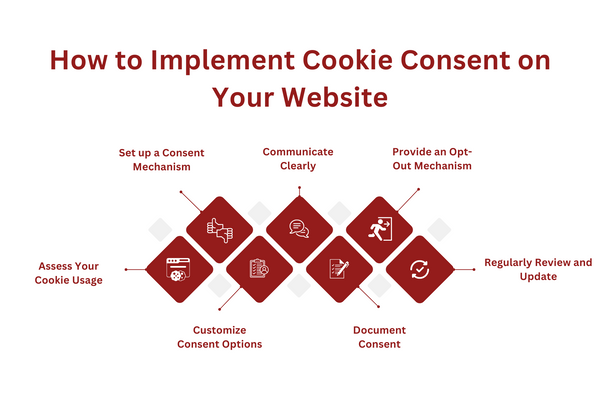
Google is sending out emails letting users know if they are running Google Adwords and they are not utilizing an approved Consent Management Software that they will not be able to target ads as they’d like to targeting specific data subjects. This will be common eventually in all 50 states and every country you’d like to run ads for. It’s a good business practice to have privacy centric operations and Captain Compliance can help with every step of the process.
If you own or manage a website, you’re probably no stranger to cookies and cookie consent. However, you may be unclear about how to implement cookie consent on your website. Don’t worry; we’ve got you covered!
This article will dive deep into cookie consent practicalities. We’ll examine what cookie consent is, why businesses need to observe it, how you can implement it on your website, and more.
Let’s get started.
Key Takeaways
Cookie consent is vital for online businesses to comply with data protection laws, respect user privacy rights, and build trust with their consumers.
Implementing cookie consent involves creating a transparent and customizable consent mechanism, allowing users to manage their preferences and withdraw consent.
Captain Compliance offers specialized compliance services, including cookie consent management, to ensure peace of mind when navigating the data privacy landscape.
What is Cookie Consent?

Maria Chamberlain, Owner of Acuity Total Solutions, says:
“Cookie consent is a digital handshake, ensuring websites respect our privacy boundaries- and agreeing on boundaries is healthy”
Cookies are small text files that remember user preferences, monitor online behavior, and promote personalized experiences. But here’s the catch: cookies can also raise privacy concerns since they collect users’ personal information and, at times, even sensitive personal information.
In practice, observing cookie consent means creating a cookie consent notice/banner that explains cookie usage and allows users to adjust their preferences.
Providing a cookie consent banner shows respect for consumers’ privacy. It’s about being transparent and giving consumers control over their personal information. It’s also legally required under privacy laws like the General Data Protection Regulation (GDPR) and the ePrivacy Directive.
Why is Cookie Consent Important?

Whether you run an e-commerce website, a blog, a news portal, or any online platform that interacts with user data, observing cookie consent requirements is vital.
Alana Gibson, Chief Operating Officer at DGR Legal, says:
“Cookie consent is vital for respecting user privacy, complying with international data protection regulations, and building trust with website visitors.”
Let’s expand on the major reasons implementing cookie consent is essential:
Legal Compliance
Through valid cookie consent, you ensure compliance with many data protection laws, including the GDPR. In other words, you avoid legal exposure, fines, and other penalties for violating privacy laws.
Enhanced Trust
Respecting your users’ privacy rights builds trust. When you prioritize their consent, users feel more confident sharing their information, leading to increased conversions and consumer loyalty.
Data Insights
Valid cookie consent lets you collect data about your consumers’ behavior, including page views, clicks, and session duration. This information enables you to make data-driven decisions that optimize your website’s performance and increase engagement.
For example, cookies can help you remember users’ language preferences during each visit to provide a seamless browsing experience.
Targeted Advertising
With proper consent, you can legally use cookies to deliver personalized ads to your audience. This helps display tailored product recommendations, resulting in higher click-through rates and sales.
Reputation Management
Demonstrating a commitment to data protection (through cookie consent) enhances your reputation as a responsible business. It shows that you value your customers and their privacy rights.
Competitive Advantage
Implementing cookie consent ahead of your competitors can position you as a leader in data privacy. It sets you apart and attracts privacy-conscious consumers who value transparency and control.
Want to implement cookie consent on your website properly? Get in touch with us today for a free consultation so you can find out what you need to do for compliance.
What are the Types of Cookies?
Understanding the different types of cookies can help you navigate their intricacies more effectively.
Cookies generally fall into one or more of the following categories:
Session Cookies: These temporary cookies are essential for smooth website functionality. They are created when users first visit a website and are deleted once users close their browsers.
Persistent Cookies: Unlike session cookies, persistent cookies stay on users’ devices even after they close their browsers. Persistent cookies have an expiration date and are typically used for remembering login information or customizing website settings for future visits.
First-Party Cookies: First-party cookies are set directly by the website a user visits. They’re typically used to recall users’ browsing preferences.
Third-Party Cookies: These cookies come from external domains and are placed by third-party services, often for advertising and tracking purposes. They collect information across multiple websites to deliver targeted ads or analyze user behavior.
Strictly Necessary Cookies: These cookies are vital for the basic functioning of a website. They enable core features like page navigation, secure login, and shopping cart functionality. Strictly necessary cookies do not require user consent.
Performance Cookies: These cookies gather anonymous data about how visitors use a website, including the number of visits, pages viewed, and average time spent. The insights help website owners improve performance and user experience.
Functionality Cookies: Functionality cookies promote personalized browsing experiences by remembering users’ choices, such as language preferences, font size, or customized layouts.
Targeting or Advertising Cookies: These cookies track users’ online behavior to deliver targeted ads based on user interests. They can also measure the effectiveness of advertising campaigns.
From this breakdown, it’s clear that cookie types aren’t set in stone. In other words, a cookie can belong to more than one of the cookie categories outlined above.
What Type of Businesses Must Observe Cookie Consent?
Cookie consent requirements can vary depending on local regulations and the nature of a business. Observing cookie consent (even when not legally required) is a best practice for businesses today.
If you aren’t sure whether you need to adhere to cookie consent requirements, it’s best to play it safe and set up a cookie consent banner regardless.
Below are the major classes of businesses that must observe cookie consent:
Businesses with European Customers: If your business targets or serves consumers in the European Union (EU), observing cookie consent requirements is essential, thanks to the GDPR.
Businesses Using Targeting/Advertising Cookies: If your website uses cookies for targeted advertising, you must obtain cookie consent. Remember, cookie consent standards ensure transparency and user control over data collection and targeted advertising.
Businesses Processing Personal Information: Any business that processes personal information through cookies should implement cookie consent regardless of applicable privacy laws. Personal information refers to data that can identify an individual, including names, email addresses, and IP addresses.
Businesses Collecting Analytics Data: If your website collects analytics data through cookies, it’s advisable to implement cookie consent. Although analytics cookies may not directly identify consumers, you must still inform consumers about how you collect their data through cookies and let them opt out.
How to Implement Cookie Consent on Your Website

Before implementing cookie consent on your website, you must first understand the specific consent requirements of data protection laws in your jurisdiction.
For instance, Europe’s GDPR requires businesses to get explicit consent (“opt-in”) from consumers before placing cookies on their devices. In contrast, privacy laws in the United States like the CPRA allow businesses to place cookies on consumers’ devices without their explicit consent (“opt-out”).
Here are the significant steps to implement cookie consent on your website.
Assess Your Cookie Usage
Start by understanding what cookies your website uses and their purpose. Conduct a comprehensive cookie audit to identify the types of cookies, their lifespan, and the data they collect.
For example, you must know if your website uses performance cookies for analytics or targeting cookies for personalized ads.
Set up a Consent Mechanism
Choose a suitable consent mechanism that allows users to provide informed consent for cookie usage. This can be in the form of a banner, pop-up, or privacy preference center.
Your cookie consent mechanism must inform visitors about your cookie practices and provide options to accept or manage cookie preferences.
Customize Consent Options
Next, you need to provide granular options for users to manage their cookie preferences. Allow them to select which specific types of cookies they wish to turn on or off.
Practically speaking, checkboxes, buttons, or toggles for users to control their preferences are most effective.
Communicate Clearly
Ensure your cookie consent notice/banner is clear, concise, and easy to understand. Use plain language to explain the purpose of each cookie category and how they enhance the user experience.
For instance, clearly explain that strictly necessary cookies are essential for website functionality, while performance and targeting cookies help personalize content and improve advertising relevance.
Document Consent
Keep a record of user consent to demonstrate compliance with privacy laws. Maintain a consent log with timestamps and the specific preferences chosen by each user.
Provide an Opt-Out Mechanism
Offer users an option to withdraw their consent and turn off cookies anytime. Make it easy for them to change their preferences or revoke consent.
One effective way is to set up a preference center or settings page where users can easily manage their cookie preferences and opt-out if desired.
Regularly Review and Update
Finally, you must review your cookie usage and consent mechanisms to ensure ongoing compliance. Update your cookie consent notice as needed to reflect any changes in your practices.
Need help implementing cookie consent on your website? Get in touch with us now for a complimentary consultation so you can find out how you can ensure compliance today.
Methods for Setting Up Cookie Consent
When exploring the cookie consent options available, you should choose the method that best suits your technical capabilities and website setup. Remember to consider ease of implementation, customization options, and compliance with privacy laws.
Here are some commonly used approaches that you can consider:
Website Builder Integration
If you’re using a website builder or consent management system (CMS), check if it offers built-in cookie consent features. Many platforms have native options or plugins that seamlessly integrate with your website.
With platforms like Captain Compliance, WordPress, or Shopify, you can leverage plugins or built-in settings to handle cookie consent, making implementation easier.
Cookie Consent Plugins
Using dedicated cookie consent plugins can also simplify your process. These plugins often provide customizable consent banners, preference centers, and built-in compliance features.
For instance, you can install a popular cookie consent plugin like “CookiePro” that provides pre-designed consent banners and automated compliance management.
Custom Development
For more control and flexibility, you can develop a custom cookie consent solution tailored to your website’s needs. This method requires technical expertise or the assistance of a web developer.
JavaScript Libraries
Another popular option is to leverage JavaScript libraries that provide ready-made cookie consent components. These libraries typically come with customizable options and built-in code snippets.
Manual Implementation
If you have coding knowledge, you can manually code and customize your own cookie consent solution. This way, you have complete control over the consent mechanism’s design and behavior.
Regardless of your chosen method, ensure that your cookie consent setup effectively communicates with consumers, allows granular consent management, and respects user privacy choices.
FAQs
Why do I need to implement cookie consent on my website?
Implementing cookie consent ensures compliance with data privacy laws, respects user privacy rights, and builds trust with your visitors.
Find out more about Data Compliance Solutions.
What are the consequences of not having cookie consent on my website?
Not having cookie consent can result in legal penalties, damage to your reputation, and loss of consumer trust. Remember, non-compliance with data protection regulations can have severe consequences for your business.
How can I customize the cookie consent banner to match my website’s design?
Many cookie consent solutions provide customization options, allowing you to modify the banner’s appearance, colors, text, and position to integrate it into your website’s design seamlessly.
Check out Data Protection Compliance Services
Can I use cookie consent solutions for mobile apps as well?
Yes, there are cookie consent solutions available for mobile apps. Look for mobile-specific consent management tools or SDKs (Software Development Kits) that offer similar functionalities for obtaining consent within your mobile app.
Want to understand Global Privacy Control (GPC)? Click here to find out.
What should I include in the cookie consent notice?
Your cookie consent notice should include clear and concise information about the types of cookies used, their purpose, how users can manage their preferences, and a link to your privacy policy for further details.
Learn more about drafting your privacy policy here.
How Can Captain Compliance Help You?
Our team of experts specializes in data privacy compliance services, including cookie consent management. Through extensive knowledge of data protection laws, we can help you confidently navigate compliance.
Our tailored solutions will assess your cookie usage, provide customized consent mechanisms, and ensure your website meets all legal requirements.
Ready to take the next step towards compliance success? Get in touch today for a 100% free consultation to find out your next steps.